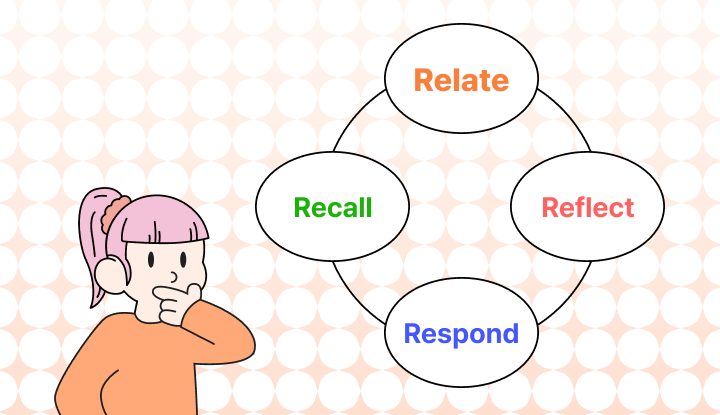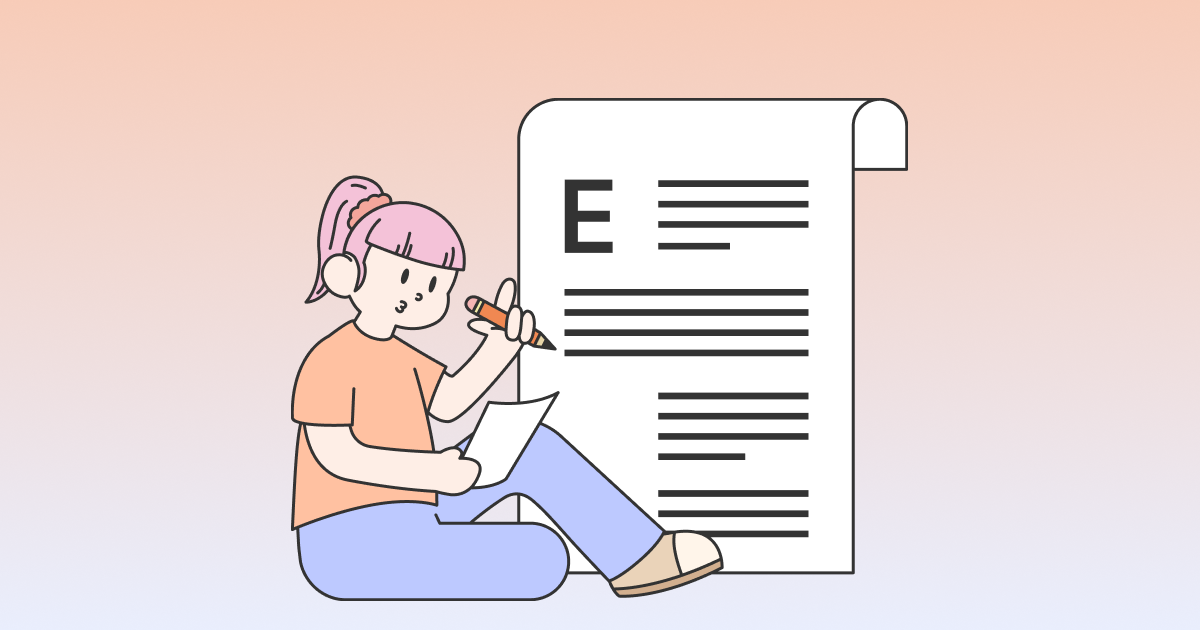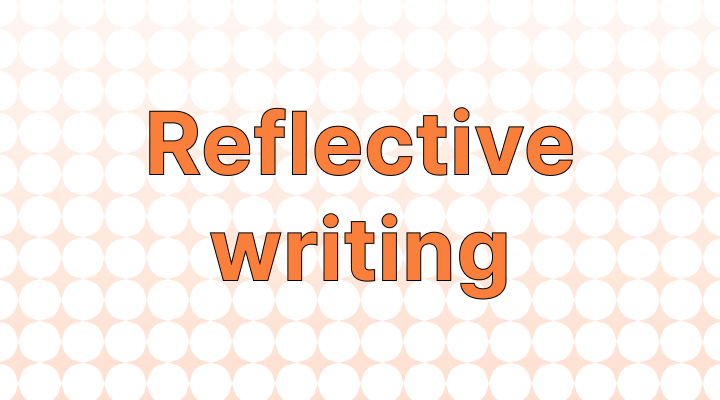Reflection is important in our everyday lives, as it relieves stress and gives us space and time to constructively learn from our experiences.
Now let's set aside some time to take a deep breath, pick up that pen, and begin our journey into reflective writing.


Table of content
- Benefits of reflective writing
- Three reflective writing models
- Personal reflective writing
- Professional reflective writing
- Reflective writing tips
- Conclusion
Benefits of reflective writing
In a study conducted by the Harvard Business School in 2013, a call group was divided into three groups: one reflected for fifteen minutes after the training session, one reflected daily, and the third group did not reflect at all. "The first group saw a 22.8% increase in productivity, while the second group's productivity jumped by 25%. The third group showed no improvement." These results spell out the incredible benefits of reflective practice.
Writing takes your reflections a step further by helping you make your introspections more concrete. In a study published by MedEdPublish, "81% of house officers agreed that reflective writing improves learning, helps in self-regulation, and alters clinical behavior."
As seen from this second study, reflection does not need to stop at thought; you can turn your thoughts into writing to be more constructive to your learning.
Three reflective practice models
Practicing reflection does not come easily for some. Below are three models that you can use to begin your reflective writing.
Six-minute freewrite
Six-minute freewriting can go a long way, and Gillie Bolton describes this model in her book "Reflective Writing: A How-to Guide."
Gillie Bolton's six-minute freewrite model is a structured approach to freewriting that encourages spontaneity, creativity, and self-expression within a limited time frame. All you need to do is pick up a pen, set a timer for six minutes, and write on a topic for those minutes.
Below is a PDF of an entry from a student, who used the six-minute freewrite model. The writer is a student studying for the TOEFL exam.
4 R's model
The 4 R's is a well-known model for honing reflective thinking. Use the 4 R's model to practice reflective thinking or writing.
Explain and fit your thoughts into one of the 4 R's below:
- Recall: This involves recalling the experiences or events that you are reflecting upon.
- Relate: After recalling the experience, you then relate it to your thoughts, feelings, and reactions at the time.
- Reflect: This is the core of reflective thinking. Reflection involves analyzing and critically evaluating the experience.
- Respond: Finally, you respond by considering how you might apply what you've learned from the reflection to future situations or actions.
Below is an infographic and a PDF of a reflective writing example using the 4 R's model. The written example is from a student studying for the TOEFL exam.


Gibbs' Reflective Cycle
Gibbs' Reflective Cycle is a structured model for reflection that guides individuals through a systematic process of examining experiences, emotions, and actions to promote personal growth. The cycle consists of six stages:
- Description: In this stage, individuals describe the experience or event they are reflecting upon in detail.
- Feelings: Here, individuals explore their emotions and reactions to the experience. They consider how they felt at the time and reflect on any emotions that arose during or after the event.
- Evaluation: In the evaluation stage, individuals reflect on what went well and what could have been improved, examining both positive and negative aspects of the experience.
- Analysis: Individuals explore the underlying factors that influenced their thoughts, feelings, and actions. They consider the context of the experience, including any external factors or personal beliefs that may have played a role.
- Conclusion: In the conclusion stage, individuals conclude their reflection. They identify key lessons learned from the experience and consider how it has contributed to their personal or professional development.
- Action plan: Finally, in the action plan stage, individuals develop a plan for future action based on their reflections. They identify specific steps they can take to apply their learning, address areas for improvement, or make changes in their behavior or practice.
Below is a PDF of a TOEFL student's study log that used the Gibbs' Reflective Cycle:
Personal reflective writing
Personal reflective writing should be stress-free. With just a pen and paper, you are allowed to write whatever you want, whenever you want. You can write it structured or unstructured. It's yours to write, and yours to keep.
We have decided to include five excerpts from famous nonfiction writings that people have noted as deep and reflective.
Please bear in mind that most of these authors, except for Anne Frank, had an audience in mind when writing these pieces, so these will be more structured than the average entry in a personal diary. Click the button below to turn your thoughts into eloquent rewrites with Engram's Paraphraser.

Famous examples of personal reflective writing
1. Anne Frank - "The Diary of a Young Girl"
"It's really a wonder that I haven't dropped all my ideals, because they seem so absurd and impossible to carry out. Yet I keep them, because in spite of everything, I still believe that people are really good at heart. I simply can't build up my hopes on a foundation consisting of confusion, misery, and death. I see the world gradually being turned into a wilderness, I hear the ever-approaching thunder, which will destroy us too, I can feel the sufferings of millions and yet, if I look up into the heavens, I think that it will all come right, that this cruelty too will end, and that peace and tranquility will return again." - Anne Frank
Anne Frank has been a household name since her book's publication. Her book "The Diary of a Young Girl" is about a Jewish girl hiding with her family during the Holocaust, detailing her experiences, thoughts, and emotions while living in confinement in Amsterdam.
Even in this excerpt, Anne Frank is very honest in her writing and grapples with the difficult emotions of "confusion, misery, and death." After contemplation, she remains positive about a brighter future. Her pure and innocent view of life is what has remained in the hearts of her readers long after they have read the book.
2. Virginia Woolf - "A Room of One's Own"
"I need not hate any man; he cannot hurt me. I need not flatter any man; he has nothing to give me." - Virginia Woolf
Virginia Woolf, a famous feminist, wrote about her ideas on feminism in an intellectual and thought-provoking way. This specific book, "A Room of One's Own," also known as the feminist manifesto, is an extended essay that explores the relationship between women and literature, as well as broader issues of gender, identity, and creativity.Woolf was an intellectual in her own right, so her writing sounds authoritative and poignant.
This excerpt shows that her intellect was the tool that allowed her to become independent. Woolf's strength and conviction are values that have kept the book and the author relevant to its readers for all these years.
3. Maya Angelou - "I Know Why the Caged Bird Sings"
"My mission in life is not merely to survive, but to thrive; and to do so with some passion, some compassion, some humor, and some style." - Maya Angelou
Maya Angelou (1928-2014) was an acclaimed American poet, memoirist, singer, actress, and civil rights activist. This excerpt is from her most famous book, "I Know Why the Caged Bird Sings," which chronicles Angelou's childhood and adolescence and focuses on her early years growing up in the segregated South and her journey to self-discovery and empowerment.
This particular quote is empowering to the readers as Maya Angelou compares the concepts of "survival" and "passion" to show her firm belief in the value of life. She also incorporates a lighthearted tone to engage the readers.
4. Henry David Thoreau - "Walden"
"If a man does not keep pace with his companions, perhaps it is because he hears a different drummer. Let him step to the music which he hears, however measured or far away." - Henry David Thoreau
"Walden" chronicles Thoreau's experiences living in a small cabin he built near Walden Pond in Concord, Massachusetts, for over two years.
The book "Walden" remains popular and influential because of its poignant insights into the human condition. Thoreau's celebration of simplicity, self-reliance, and the beauty of the natural world continues to be values that encourage readers to perceive their lives and the world they live in with a different perspective.
5. Joan Didion - "The White Album"
"We are imperfect mortal beings, aware of that mortality even as we push it away, failed by our very complication, so wired that when we mourn our losses we also mourn, for better or for worse, ourselves. As we were. As we are no longer. As we will one day not be at all." - Joan Didion
"The White Album" is both a book and the title of an essay within the book. In the essay, Didion reflects on her experiences living in California during the late 1960s, a time of social upheaval, political unrest, and cultural change.Joan Didion is known for capturing the rawness of her emotions in her prose.
Even in this quote, Didion links the idea of mortality and the feeling of mourning to emphasize the imperfections of human life. Many readers empathize with Joan Didion's writing because her vulnerability provides a safe space for them to ponder and pick apart their complex emotions.

Professional reflective writing
Professional reflective writing can be personal, but since it is written for professional reasons, we advise using the 4 R's model or any other structured model when writing these pieces.
Education
Through self-reflection, students can cultivate empathy, interpersonal skills, and lifelong learning habits for professional success. These reflections, when turned to writing, enhance critical thinking, self-awareness, and problem-solving skills in students.
Example situations that students can reflectively write about:
- A successful aspect of your project or group collaboration
- A challenging aspect of your project or group collaboration
- A task that presented significant difficulty
- A task that broadened your awareness or tested your comprehension of social justice matters
- Peer feedback
- An occurrence involving conflict, hostility, aggression, or criticism
Healthcare
Through reflective writing, healthcare professionals, especially nurses, develop essential skills in self-awareness, critical thinking, and professional growth, leading to enhanced clinical practice and improved patient outcomes.
Example scenarios in which healthcare professionals could engage in reflective writing include:
- A sudden medical crisis
- An atypical health condition
- A challenging circumstance
- A communication issue (e.g., with a patient or colleague)
- A memorable interaction with a patient (whether positive or negative)
- An event that triggered feelings of inadequacy
- A moment of feeling challenged
- An occurrence prompting a shift in perspective or questioning of assumptions or beliefs.
A course on reflective practice is usually required in a nurse's education. Through writing assignments, clinical debriefings, and peer feedback, students explore experiences, utilizing models like Gibbs' Reflective Cycle.

Social media and blogs
Reflective writing adds depth, authenticity, and engagement to a blog or a social media post, making it more than just a platform for sharing information--it becomes a space for meaningful reflection, dialogue, and personal connection.
Example topics for reflective writing in social media and blogging include:
- Personal growth journey
- Overcoming challenges
- Career reflections
- Creative process insights
- Travel reflections
- Relationship reflections
- Health and wellness journey
- Personal finance reflections
Reflective writing tips
We conclude this blog post with an infographic of general reflective writing tips. Hang this up in your classroom and use this as your computer desktop. Just remember that the more you practice reflective writing, the better it is for your writing.

Conclusion
Reflective essays serve as powerful tools for learning about oneself.
Through introspection and analysis, we uncover valuable insights, confront challenges, and celebrate triumphs. Finally, the skill empowers us to navigate life's complexities with clarity, purpose, and resilience.

References:
How Reflections Helps us Learn According to Science Benefits of Reflective Writing in Health Care through the Vivid Lens of House Officers












